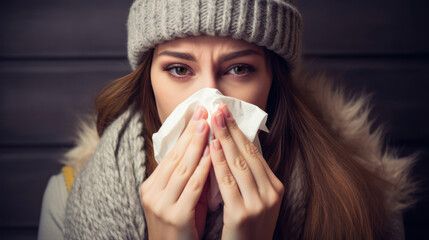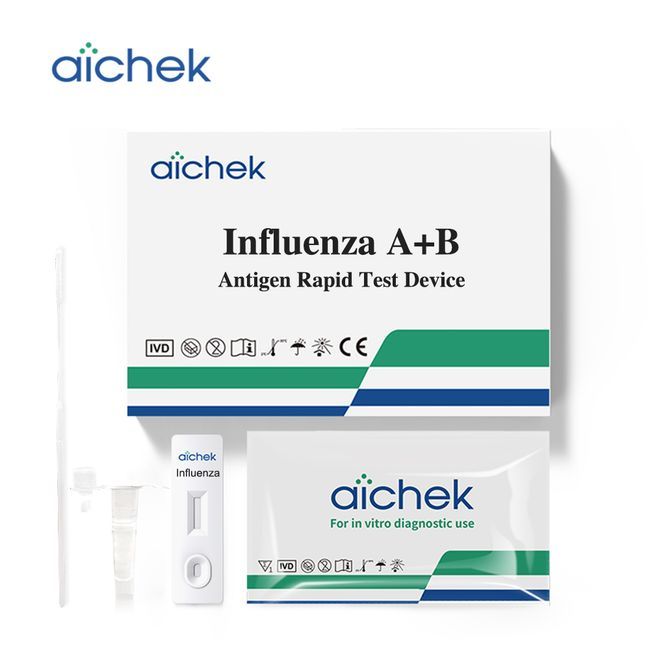
Get A Quote
When Does Influenza Season Start? The Clearest Answer for You
Are you prepared for Influenza season? If you still don’t know when does influenza season start, this article can have a clear introduction for you, help you to know exact time of influenza spreading and how to protect yourself.
What Is Influenza?
Influenza, commonly known as the flu, is caused by viruses, particularly Influenza A and sometimes Influenza B.
The flu A, primarily linked to the Influenza A virus, is a widespread respiratory illness that spreads easily from person to person. Compared to the common cold, Influenza A is more severe and can lead to significant outbreaks and serious health issues. It's important to note that the virus causing COVID-19 differs from the influenza virus. During colder months, typically in winter, Influenza A infections tend to be more prevalent, with various subtypes or strains circulating within communities.
Just like influenza A viruses, influenza B viruses are also categorized into specific clades and sub-clades. Compared to influenza A viruses, particularly influenza A(H3N2) strains, influenza B viruses tend to undergo genetic and antigenic changes at a slower pace. Recent influenza surveillance data indicates the simultaneous presence of influenza B viruses from both lineages across the globe, including in the United States. However, the distribution of influenza B viruses from each lineage can differ based on geographical regions and seasons. Over the past few years, there has been a notably lower circulation of flu B/Yamagata viruses globally when compared to the prevalence of flu B/Victoria viruses.
When Does Flu Season Usually Start?
The start and end of the flu season vary depending on geographical location. According to Alicia Budd, an epidemiologist from the Centers for Disease Control and Prevention (CDC), in the United States, flu activity usually escalates from October and may persist until May.
The CDC monitors flu activity year-round, pinpointing the beginning of the season when certain key indicators surpass specific thresholds. This seasonality primarily occurs due to lower temperatures. Tania Mucci-Elliott, a clinical instructor of medicine, notes that flu viruses thrive and spread faster in colder climates.
Winter, with its reduced temperatures and longer indoor periods, provides an environment where the flu, alongside other viruses, spreads more easily among people. The CDC identifies peak flu activity by assessing the month with the highest percentage of positive influenza tests, commonly peaking in February but also in December, January, or March.
Why Does Influenza Spread More Rapidly During Cold Weather?
Research conducted by Dr. Peter Palese in 2007 shed light on why the flu spreads more rapidly in cold weather. He discovered that the influenza virus transmits more effectively in colder and drier conditions based on experiments with guinea pigs.
Studies also revealed that the virus survives longer at low temperatures and low humidity, contributing to increased infection rates during the winter season. Interestingly, in warmer climates, the flu behaves differently, correlating higher infection rates with high humidity and abundant rainfall.
Despite some conflicting findings, the prevailing understanding suggests that the influenza virus survives longer in cold, dry air, which facilitates its transmission from person to person during the winter months.
How Does the Flu Spread?
The primary mode of influenza virus transmission is person-to-person through respiratory droplets expelled during coughs and sneezes. These droplets can land on the mouth or nose of nearby individuals, or spread via surfaces that people touch before touching their own face without washing hands.
Contaminated items such as linens, utensils, and dishes belonging to infected individuals should be washed thoroughly to prevent the spread of the virus. Importantly, individuals should maintain good hygiene practices, including handwashing, to mitigate the risk of infection.
Flu is contagious, with infected individuals able to transmit the virus a day before symptoms appear and up to 5-7 days after falling ill. In some cases, individuals may carry the virus without showing symptoms, posing a risk of spreading it to others unknowingly. Wondering how does infectious diseases spread? Click the blog to know the detail.
How to Protect Yourself from Influenza?
To protect yourself from influenza, following these actionable steps can significantly help in preventing the spread of germs.
Personal Practices:
1.Avoid Close Contact: Stay away from sick people and keep your distance if you're unwell.
2.Stay Home When Sick: If possible, avoid work, school, and public places to prevent spreading illness.
3.Cover Your Mouth and Nose: Use a tissue when coughing or sneezing to stop germs from spreading.
4.Clean Your Hands: Wash hands frequently with soap and water. Use alcohol-based hand rubs when soap isn't available.
5.Avoid Touching Face: Refrain from touching your eyes, nose, and mouth to prevent germ transmission.
6.Practice Good Health Habits: Get adequate sleep, exercise, manage stress, stay hydrated, and eat healthily.
Nonpharmaceutical Interventions (NPIs):
For Schools:
1.Ensure regular cleaning of surfaces and availability of hygiene supplies.
2.Implement separation and care protocols for sick individuals.
3.Understand school plans for illness outbreaks and vaccination availability.
For Workplaces:
1.Regularly clean surfaces and provide necessary supplies for hygiene.
2.Have plans for illness outbreaks and on-site flu vaccinations.
3.Train employees on covering for each other in case of sickness.
Conclusion
So we have known the answer of “when does influenza season start”, it’s usually during winter, and have a well protection for you and your familes is necessary. After all, if you suspect you might get flu, you can have nough at-home influenza test kits for testing yourself. And always be alert to your health, with everything of Influenza knowledge, you and your families will be safe away with virus.


